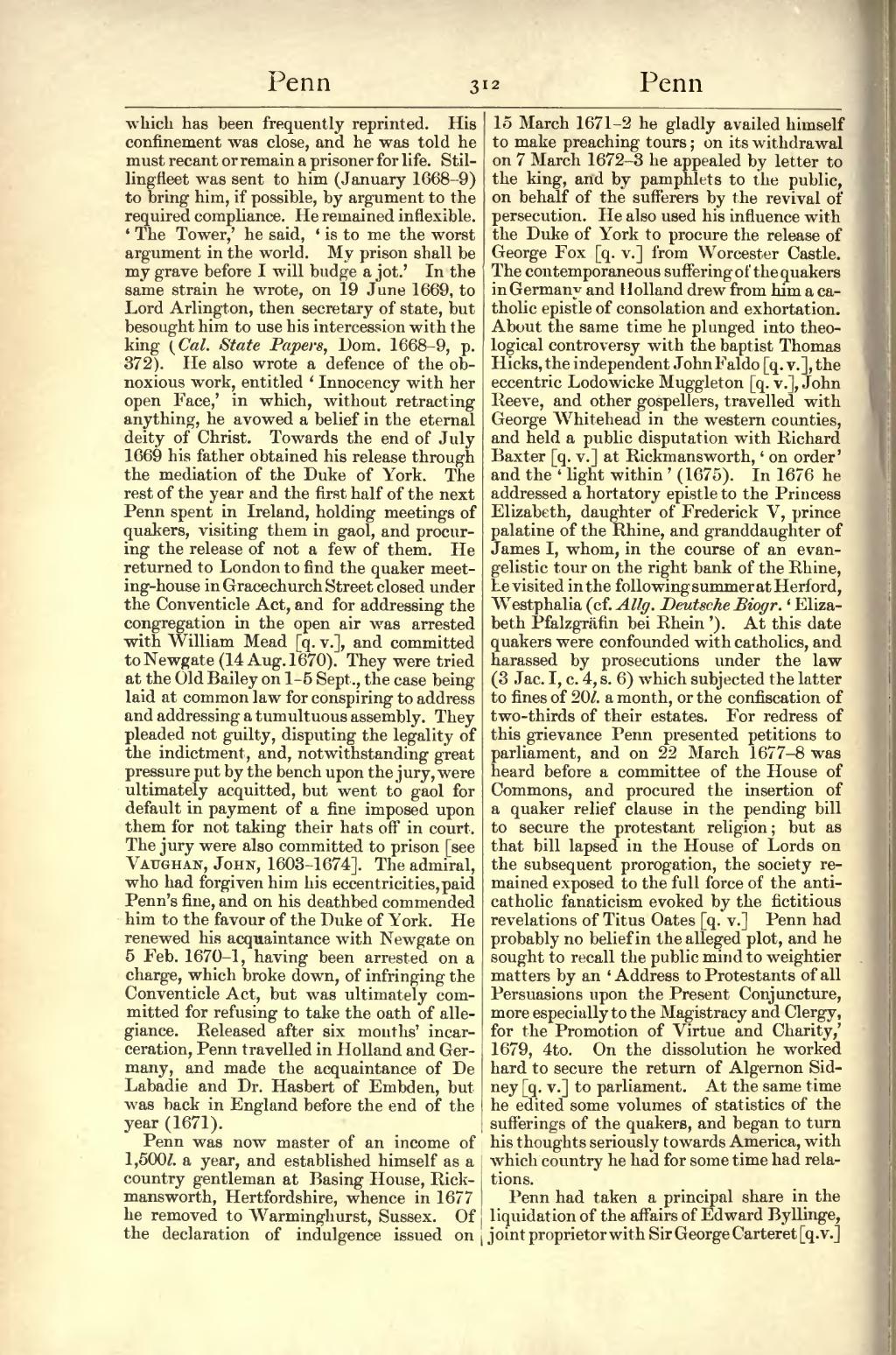which has been frequently reprinted. His confinement was close, and he was told he must recant or remain a prisoner for life. Stillingfleet was sent to him (January 1668–9) to bring him, if possible, by argument to the required compliance. He remained inflexible. ‘The Tower,’ he said, ‘is to me the worst argument in the world. My prison shall be my grave before I will budge a jot.’ In the same strain he wrote, on 19 June 1669, to Lord Arlington, then secretary of state, but besought him to use his intercession with the king (Cal. State Papers, Dom. 1668–9, p. 372). He also wrote a defence of the obnoxious work, entitled ‘Innocency with her open Face,’ in which, without retracting anything, he avowed a belief in the eternal deity of Christ. Towards the end of July 1669 his father obtained his release through the mediation of the Duke of York. The rest of the year and the first half of the next Penn spent in Ireland, holding meetings of quakers, visiting them in gaol, and procuring the release of not a few of them. He returned to London to find the quaker meeting-house in Gracechurch Street closed under the Conventicle Act, and for addressing the congregation in the open air was arrested with William Mead [q. v.], and committed to Newgate (14 Aug. 1670). They were tried at the Old Bailey on 1–5 Sept., the case being laid at common law for conspiring to address and addressing a tumultuous assembly. They pleaded not guilty, disputing the legality of the indictment, and, notwithstanding great pressure put by the bench upon the jury, were ultimately acquitted, but went to gaol for default in payment of a fine imposed upon them for not taking their hats off in court. The jury were also committed to prison [see VAUGHAN, JOHN, (1603–1674)]. The admiral, who had forgiven him his eccentricities, paid Penn's fine, and on his deathbed commended him to the favour of the Duke of York. He renewed his acquaintance with Newgate on 5 Feb. 1670–1, having been arrested on a charge, which broke down, of infringing the Conventicle Act, but was ultimately committed for refusing to take the oath of allegiance. Released after six months' incarceration, Penn travelled in Holland and Germany, and made the acquaintance of De Labadie and Dr. Hasbert of Embden, but was back in England before the end of the year (1671).
Penn was now master of an income of 1,500l. a year, and established himself as a country gentleman at Basing House, Rickmansworth, Hertfordshire, whence in 1677 he removed to Warminghurst, Sussex. Of the declaration of indulgence issued on 15 March 1671–2 he gladly availed himself to make preaching tours; on its withdrawal on 7 March 1672–3 he appealed by letter to the king, and by pamphlets to the public, on behalf of the sufferers by the revival of persecution. He also used his influence with the Duke of York to procure the release of George Fox [q. v.] from Worcester Castle. The contemporaneous suffering of the quakers in Germany and Holland drew from him a catholic epistle of consolation and exhortation. About the same time he plunged into theological controversy with the baptist Thomas Hicks, the independent John Faldo [q. v.], the eccentric Lodowicke Muggleton [q. v.], John Reeve, and other gospellers, travelled with George Whitehead in the western counties, and held a public disputation with Richard Baxter [q. v.] at Rickmansworth, ‘on order’ and the ‘light within’ (1675). In 1676 he addressed a hortatory epistle to the Princess Elizabeth, daughter of Frederick V, prince palatine of the Rhine, and granddaughter of James I, whom, in the course of an evangelistic tour on the right bank of the Rhine, he visited in the following summer at Herford, Westphalia (cf. Allg. Deutsche Biogr. ‘Elizabeth Pfalzgräfin bei Rhein’). At this date quakers were confounded with catholics, and harassed by prosecutions under the law (3 Jac. I, c. 4, s. 6) which subjected the latter to fines of 20l. a month, or the confiscation of two-thirds of their estates. For redress of this grievance Penn presented petitions to parliament, and on 22 March 1677–8 was heard before a committee of the House of Commons, and procured the insertion of a quaker relief clause in the pending bill to secure the protestant religion; but as that bill lapsed in the House of Lords on the subsequent prorogation, the society remained exposed to the full force of the anti-catholic fanaticism evoked by the fictitious revelations of Titus Oates [q. v.] Penn had probably no belief in the alleged plot, and he sought to recall the public mind to weightier matters by an ‘Address to Protestants of all Persuasions upon the Present Conjuncture, more especially to the Magistracy and Clergy, for the Promotion of Virtue and Charity,’ 1679, 4to. On the dissolution he worked hard to secure the return of Algernon Sidney [q. v.] to parliament. At the same time he edited some volumes of statistics of the sufferings of the quakers, and began to turn his thoughts seriously towards America, with which country he had for some time had relations.
Penn had taken a principal share in the liquidation of the affairs of Edward Byllinge, joint proprietor with Sir George Carteret [q. v.]
